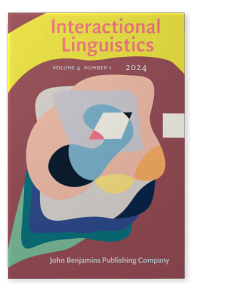Interactional Linguistics
In the past two decades, usage-based approaches to linguistic inquiry have forged an empirically grounded comprehension of language as locally contingent, temporal, and ever-adaptive. Interactionally-oriented approaches to the study of language have evidenced both how linguistic structures function as resources for organizing social interaction, and, conversely, how social interaction shapes linguistic structures.
Interactional Linguistics aims to advance our understanding of this symbiotic relationship between language and social interaction, contributing to a more encompassing comprehension of what language is, in light of its use within the dynamics of social interaction. This fully peer-reviewed journal publishes original research that demonstrates how close scrutiny of linguistic structures as they occur in social interaction can deepen our appreciation of the functional and formal aspects of language, be it within a single language or cross-linguistically. The journal publishes qualitative and quantitative research and welcomes empirical as well as theoretical arguments.
Interactional Linguistics publishes its articles Online First.
Information on Open Access publication can be found under the button Submission below.
Latest articles
10 January 2025
20 December 2024
10 December 2024
6 December 2024
1 October 2024
11 July 2024
30 April 2024
25 April 2024
23 April 2024
5 April 2024
18 March 2024
12 January 2024
11 January 2024
9 January 2024
23 October 2023
4 May 2023
28 March 2023
15 December 2022
22 August 2022
16 August 2022
13 January 2022
21 December 2021
13 December 2021
22 November 2021
15 November 2021
2 August 2021
18 June 2021
11 June 2021
6 May 2021
16 April 2021
Issues
Online-first articlesVolume 4 (2024)
Volume 3 (2023)
Volume 2 (2022)
Volume 1 (2021)
Board
Subscription Info
General information about our electronic journals.
Subscription rates
All prices for print + online include postage/handling.
| Online-only | Print + online | ||
|---|---|---|---|
| Volume 5 (2025): 2 issues; ca. 250 pp. | EUR |
EUR |
|
| Volume 4 (2024): 2 issues; ca. 250 pp. | EUR |
EUR |
Individuals may apply for a special online-only subscription rate of EUR
Private subscriptions are for personal use only, and must be pre-paid and ordered directly from the publisher.
Available back-volumes
| Online-only | Print + online | ||
|---|---|---|---|
| Complete backset (Vols. 1‒3; 2021‒2023) |
6 issues; 750 pp. |
EUR 486.00 | EUR 544.00 |
| Volume 3 (2023) | 2 issues; 250 pp. | EUR |
EUR |
| Volumes 1‒2 (2021‒2022) | 2 issues; avg. 250 pp. | EUR |
EUR |
Submission
Interactional Linguistics offers online submission .
Before submitting, please consult the guidelines and the Short Guide to EM for Authors .
If you are not able to submit online, or for any other editorial correspondence, please contact the editors via e-mail: interactional.linguistics
Ethics
John Benjamins journals are committed to maintaining the highest standards of publication ethics and to supporting ethical research practices.
Authors and reviewers are kindly requested to read this Ethics Statement .
Please also note the guidance on the use of (generative) AI in the statement.
Rights and Permissions
Authors must ensure that they have permission to use any third-party material in their contribution; the permission should include perpetual (not time-limited) world-wide distribution in print and electronic format.
For information on authors' rights, please consult the rights information page.
Open Access
Articles accepted for this journal can be made Open Access through payment of an Article Publication Charge (APC) of EUR 1800 (excl. tax). To arrange this, please contact openaccess
Corresponding authors from institutions with which John Benjamins has a Read & Publish arrangement can publish Open Access without paying a fee. Please consult this list of institutions for up-to-date information on which articles qualify.
For information about permission to post a version of your article online or in an institutional repository ('green' open access or self-archiving), please consult the rights information page.
If the article is not (to be made) Open Access, there is no fee for the author to publish in this journal.
Archiving
John Benjamins Publishing Company has an agreement in place with Portico for the archiving of all its online journals and e-books.
